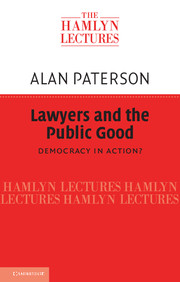Book contents
- Frontmatter
- Contents
- Tables
- Illustrations
- THE HAMLYN TRUST
- The Hamlyn Lectures
- Acknowledgements
- 1 Introduction: determining the public good
- 2 Professionalism re-assessed: what now for lawyers?
- 3 Access to justice: whither legal aid?
- 4 Judges and the public good: reflections on the last Law Lords
- 5 Conclusion
- BIBLIOGRAPHY
- Index
- References
4 - Judges and the public good: reflections on the last Law Lords
Published online by Cambridge University Press: 05 June 2012
- Frontmatter
- Contents
- Tables
- Illustrations
- THE HAMLYN TRUST
- The Hamlyn Lectures
- Acknowledgements
- 1 Introduction: determining the public good
- 2 Professionalism re-assessed: what now for lawyers?
- 3 Access to justice: whither legal aid?
- 4 Judges and the public good: reflections on the last Law Lords
- 5 Conclusion
- BIBLIOGRAPHY
- Index
- References
Summary
In Chapters 2 and 3 I looked at two institutions that are important for a properly functioning democracy: a vibrant legal profession and viable forms of access to justice. With respect to the former, I suggested that the future of the profession no longer lies entirely in their hands, but in the ongoing dialogue between the profession and the wider community. Similarly, in Chapter 3 I argued that the future of publicly funded legal assistance was no longer a matter for the profession and the Treasury, but best approached through dialogues with all the stakeholders. In this chapter a third institution which is vital for democracy– the judiciary, and the appellate judiciary in particular– will be scrutinised. My starting point here is one that was also identified by Hazel Genn in her acclaimed Hamlyn Lectures, Judging Civil Justice, in 2008: namely, that in the last forty years we have witnessed a significant growth in the power of the judiciary vis-à-vis the Executive and the legislature. This new form of constitutionalism, can be seen in the expansion of legal remedies, the exponential growth of judicial review of administrative or government decisions, the evolution of judicial case management, the judiciary’s increased role in the running of the courts, the sovereignty implications of devolution, the incorporation of the European Convention on Human Rights into UK domestic law and the establishment of the UK Supreme Court.
All of this has greatly expanded the ability of the judiciary to make determinations of the public interest. Indeed, to paraphrase A. A. Milne, ‘declaring the public interest is what judges do best’. They do it in judgments, they do it when performing an administrative role and latterly they have done it as part of what I call an intra-governmental dialogue. For most of the time the judiciary are happy making these decisions as to where the public good lies, because as public servants they feel that they are not only well qualified but often the best qualified to do this. Where they are deciding cases and the legal test turns on what the public interest is, their assumption seems uncontentious. However, much more often the judiciary are determining what they consider to be the public good in an indirect fashion through their decisions in policy areas or in judicial review cases, or in interpreting the Human Rights Act. In these areas the judiciary’s prerogative to determine the public interest does not always go unchallenged, whether by the media, when judges are extending the law on privacy; by Home Secretaries, when their powers are being curtailed by judicial decisions; and by the public, when the Supreme Court fails to protect them from what they see as unfair bank charges. My own bugbear is legal professional privilege: the right of the client to have his or her consultations with his or her legal adviser kept confidential. Over the years this has been raised from the status of a balancing principle against the court’s right to the best evidence in the pursuit of truth, to its current status of a ‘fundamental human right’ as Lord Hoffmann dubbed it in the Morgan Grenfell case, which trumps every other competing value, including the protection of life and the vindication of the innocent. Given that Parliament has said on several occasions that there are values more important than legal professional privilege, like Bentham I wonder whether in this area the judiciary really have got the public interest right.
- Type
- Chapter
- Information
- Lawyers and the Public GoodDemocracy in Action?, pp. 125 - 193Publisher: Cambridge University PressPrint publication year: 2011



